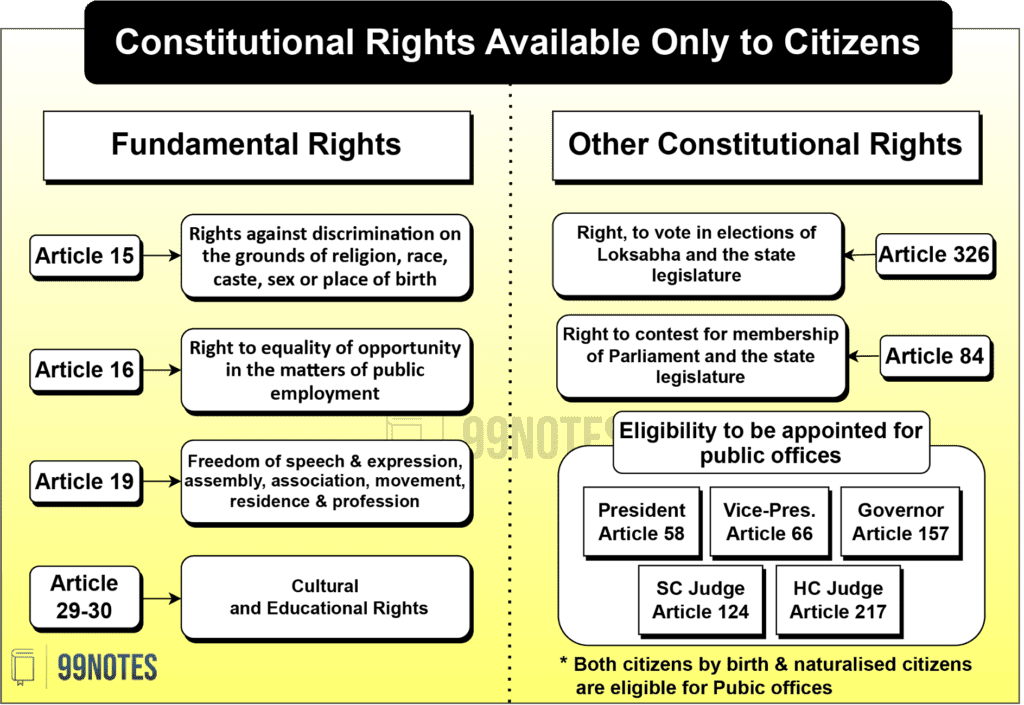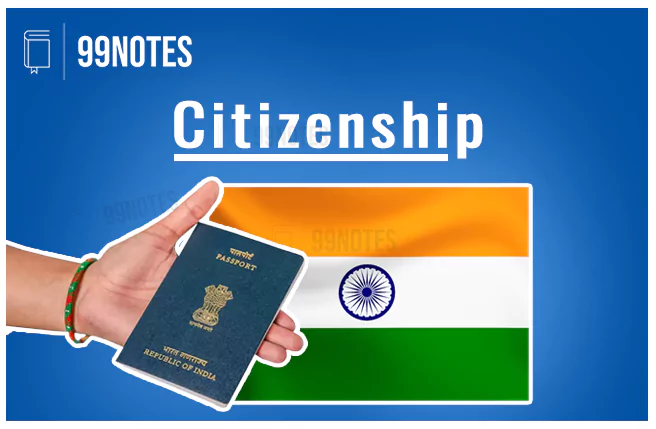Citizenship: Article 5-11 UPSC Notes
Citizenship can be defined as the legal status of membership in a political community. It is about the relationship between the state and its members and citizen-citizen relations.
Concept of Citizenship
- The concept of Citizenship arises from the relation between State and Individual. The citizen come together to form a state. They give their legitimacy and perform duties follow its laws and regulations to maintain a state.
- In return, the States grant certain rights and privileges to their citizens.

- Difference between Citizens & Non-Citizens: The concept of citizenship is important to identify the individuals who are given rights and privileges and are therefore bound by the duties towards the state. Not all rights are granted to the Non-citizens (also referred to as ‘aliens’ in Political Science)
Citizenship and Rights in Indian Constitution
With the commencement of the Constitution on 26th January 1950, the status of Indians changed from British subjects to citizens of the Republic of India, which was derived from the Constitution of India.
- Article 5 to 9 of the Indian Constitution deals with citizenship. These articles came into force on 26th November 1949, on the day of its adoption.
- The provisions given in the Constitution make a distinction between an Indian citizen and an alien (non-citizen).
- While citizens enjoy certain rights and perform duties by virtue of being a citizen, aliens also enjoy certain ‘rights of personhood’.
- Aliens have been classified into two categories; Friendly aliens (subjects of a country that has cordial relations with India) and Enemy aliens (subjects of a country that is at war with India). Enemy aliens enjoy lesser rights, e.g. they are not granted protection against arrest and detention (Article 22).
Constitutional Rights and Privileges Enjoyed Exclusively by Citizens
The constitutional rights mentioned in the Graphical representation below are available only to the citizens and not aliens. Constitutional Provisions regarding citizenship
Constitutional Provisions regarding citizenship
- The Constitution does not contain any permanent or detailed provisions regarding citizenship; it only deals with the persons who became citizens with the commencement of the Constitution.
- The Constitution empowered the Parliament to enact laws in such matters. Accordingly, Parliament has legislated the Citizenship Act 1955, which was subsequently amended in 1986, 1992, 2003, 2005 and 2020.
Who are the citizens of India?
- Article 5 to 8 of the Constitution declare the following people as the citizens of India on 26th January 1950, i.e. the commencement of the Constitution:
- Those domiciled and born in India; (Article 5)
-
- Those domiciled, not born in India but either of whose parents was born in India;
- Those domiciled, not born in India, but ordinarily resident in India for more than five years;
- Those residents in Pakistan who migrated to India before 19th July 1948 or those who came afterwards but stayed on for more than 6 months and got registered (Article 6);
- Those residents in India who migrated to Pakistan after 1st March 1947 and returned later on resettlement permits (Article 7);
- Those whose parents and grandparents were born in India but were residing outside India (Article 8).
- Other provisions regarding citizenship
-
- A person voluntarily acquiring citizenship of a foreign country loses its citizenship. (Article 9).
- Every person who is or is deemed to be a citizen of India will continue to be a citizen, subject to the laws made by the Parliament (Article 10).
- Parliament has the power to regulate all the aspects of citizenship (Article 11).
Single Citizenship
The Indian Constitution provides for a dual polity (centre and state) but with a single citizenship. Single citizenship was adopted to promote the feeling of fraternity and to strengthen the cause of national integration.
- Article 9 of the Constitution says that if a person voluntarily acquires citizenship of a foreign country, he/she is no longer an Indian citizen.
- An Indian citizen owes allegiance only to the Union, unlike the USA, where a person is a citizen of both the USA as well as of the state he/she belongs to.
- If an Indian citizen acquires citizenship of another country, he/she must surrender the Indian passport.
- In India, a citizen enjoys the same political and civil rights all over the country, irrespective of the state he/she belongs to. However, there are some exceptions to that:
- The Parliament (under Article 16) can make certain exceptions by prescribing residence as a condition for particular employment and appointments. Currently, one such provision exists for Andhra Pradesh (now extended to Telangana as well) through Article 371D.
- Article 15 prohibits discrimination on various grounds but it does not include ‘residence’, which means states can give preference or provide special benefits to its residents in matters which do not come under rights given in the Constitution. For example- Concession in exam fees etc.)
- Article 19, which provides freedom of movement and residence, is subject to the protection of the interests of scheduled tribes.
NRI, PIO and OCI |
|
Overseas citizens of India cardholders
- In 2000, a high-level committee on the Indian diaspora was set up under the chairmanship of LM Singhvi.
- The committee was asked to recommend measures for a constructive relationship with the Indian diaspora.
- The committee recommended the amendment of the Citizenship Act (1955) to provide for the grant of dual citizenship to Persons of Indian Origin (PIOs) belonging to certain specified countries.
- The Citizenship (Amendment) Act 2003 made provision for the acquisition of Overseas Citizenship of India (OCI) by the PIOs of 16 specified countries other than Pakistan and Bangladesh.
- The Citizenship (Amendment) Act 2005 expanded the scope of the grant of OCI for PIOs of all countries except Pakistan and Bangladesh as long as their home countries allow dual citizens under their local laws.
- The OCI is not dual citizenship.
- The Citizenship (Amendment) Act 2015 has introduced a new scheme called “Overseas Citizen of India Cardholder” by merging the PIO card scheme and the OCI card scheme to avoid unnecessary confusion among applicants.
- Provisions related to OCIs:
-
- OCIs are entitled to a multipurpose, multiple entry, and lifelong visa allowing them to visit India at any time, for any length of time and for any purpose.
- They are exempted from police reporting for any length of stay in the country.
- They have also been granted all rights in the economic, financial and education fields in parity with NRIs except, the right to acquisition of agricultural or plantation properties.
- They can undertake all activities except mountaineering, missionary, research work, and visiting protected/restricted areas.
- They are eligible for Indian citizenship after 5 years of registration as OCI if they stay in India for one year before making the application.
Citizenship Act, 1955
The Act provides for the acquisition and determination of Indian citizenship. The Citizenship Act 1955 provides for different ways in which Indian citizenship can be acquired: birth, descent, registration, naturalisation, and incorporation of territory.
- By Birth: A person born in India―
-
- On or after the 26th day of January 1950, but before the 1st day of July, 1987;
- On or after the 1st day of July 1987, but before the commencement of the Citizenship (Amendment) Act, 2003 and either of whose parents is a citizen of India at the time of his birth;
- On or after the commencement of the Citizenship (Amendment) Act, 2003, where― (i) both of his parents are citizens of India; or (ii) one of whose parents is a citizen of India and the other is not an illegal migrant at the time of his birth, shall be a citizen of India by birth.
- The children of foreign diplomats posted in India and enemy aliens are barred from acquiring Indian citizenship by birth.
- By Descent: A person born outside India shall be a citizen of India by descent―
-
- On or after the 26th January 1950, but before the 10th December 1992, if his father is a citizen of India at the time of his birth or;
- On or after the 10th December 1992, if either of his parents is a citizen of India at the time of his birth.
- From 3rd December 2004 onwards, a person shall not be a citizen of India by virtue of this ground unless his birth is registered at an Indian consulate within one year of birth or with the permission of the central government if the period of one year is expired
- By registration: Central Government may, on an application made on this behalf, register as a citizen of India any person not being an illegal migrant if he/she belongs to any of the following categories:
- A person of Indian origin who is ordinarily resident in India for seven years before making an application for registration;
- A person of Indian origin who is ordinarily resident in any country or place outside undivided India;
- A person who is married to a citizen of India and is ordinarily resident in India for seven years before making an application for registration;
- Minor children of persons who are citizens of India;
- A person of full age and capacity whose parents are registered as citizens of India;
- A person of full age and capacity who, or either of his parents, was earlier a citizen of independent India and is ordinarily resident in India for twelve months immediately before making an application for registration;
- A person of full age and capacity who has been registered as an Overseas Citizen of India Cardholder for five years and who is ordinarily resident in India for twelve months before making an application for registration.
- By Naturalisation: If a person has been normally a resident of India for a long time, he or she can apply for citizenship by naturalisation provided that—
- If the person has resided in India or been in the service of the Government of India throughout the period of 12 months immediately preceding the date of application.
- If the person resided in India or has been in central government service for the last 12 months and at least 11 years of the preceding 14 years.
- If the person is of good character.
- If he has the knowledge of a language specified in the 8th schedule of the Constitution.
- The government may waive all or any of the conditions. If, in the opinion of the Central Government, the applicant is a person who has rendered distinguished service to the cause of science, philosophy, art, literature, world peace or human progress
Termination of Citizenship
The Citizenship Act 1955 outlines three ways to lose citizenship—renunciation, termination, and deprivation—whether it was obtained under the Act or earlier under the Constitution.
- Renunciation: When one declares to renounce his citizenship.
- Termination: When an Indian citizen voluntarily (consciously, without any pressure, duress) acquires citizenship of another country, his Indian citizenship automatically ceases to exist. This provision, however, is not applicable during a war in which India is engaged.
- Deprivation is a compulsory termination of Indian citizenship by the Union government if:
- The citizen has obtained citizenship by fraud.
- The citizen has displayed disloyalty to the Constitution of India.
- The citizen has been engaged in ilicit trade or communication with the enemy during a war;
- The citizen has, within five years after acquiring citizenship through registration or naturalisation, served two years in prison;
- The citizen has lived outside of India on a regular basis for seven years (wouldn’t apply for education, government work, or if informed to consulate every year).
The Citizenship (Amendment) Act, 2019
It amends the Citizenship Act 1955 to enable and expedite the citizenship of illegal migrants who are Hindus, Sikhs, Buddhists, Jains, Christians and Parsis and from Afghanistan, Bangladesh and Pakistan.
- The requirements for citizenship by naturalisation: The Act relaxes the 11-year requirement to 5 years for persons belonging to the above mentioned six religions and three countries.
- The cut-off date: Only those migrants (legal or illegal) who have entered India before 31st December 2014 are eligible for citizenship under this route.
- Exception: It will not apply to the tribal areas of Assam, Mizoram, Meghalaya and Tripura as these are included in Sixth Schedule. Arunachal Pradesh, Mizoram, Manipur and Nagaland, which are protected by the ILP (Inner Line permit), are also exempted.
- Grounds for cancelling OCI registration: The Act also provides grounds for cancellation of Overseas Citizens of India card (OCI).
Criticism of the Act
-
- Discriminatory: It is being criticised as being in violation of Article 14, which provides the right to equality since the Act differentiates on the basis of religion and place of birth. However, article 14 does allow differentiation on reasonable grounds.
- Fear of nationwide NRC: There is fear among Muslims that in the case of nationwide NRC, there is a risk of them being excluded if they fail to provide the necessary documents since this Amendment Act does not cover Muslims.
- Protests in Assam: People in Assam are apprehensive of the large-scale inflow of non-Assamese people, which could affect their demography, culture and their Assamese identity.
National Register of Citizens |
|
National Population Register |
|








